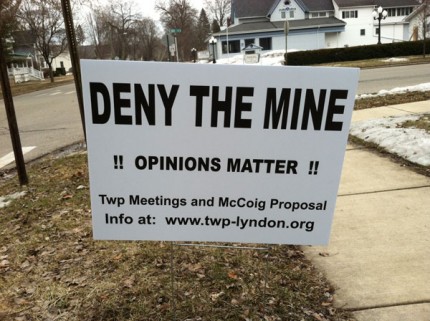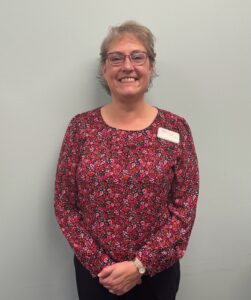
Guest column By Christine Manninen
If you live in or around Chelsea or regularly visit the area, you have no doubt seen the “Deny the Mine!” signs and t-shirts, which are springing up faster than the tulips this year.
Lyndon Township (a rural residential community) is currently faced with a grave decision that will likely impact the township, the City of Chelsea and the surrounding community for decades to come. A metro Detroit-area concrete company, McCoig Materials, is seeking permission to mine gravel near Stofer Hill (off M-52) in Lyndon Township. This proposal is causing a great deal of rancor in the community – and with good reason considering the potentially dire environmental and economic consequences to the area from such a gravel mining and processing operation.
I know I am not the only one who moved to this area specifically because of the abundance of natural resources that it provides, including the beautiful Waterloo and Pinckney state recreation areas and Washtenaw County’s Park Lyndon – one of the most biodiverse areas in the Midwest and finest natural areas in southeast Michigan. Known locally as a “botanical treasure,” Park Lyndon was protected for a reason – boasting glacier-derived rolling terrain, a diversity of wetland habitats and more than 500 species of plants and animals.
The extraction of the natural resources in Lyndon Township, as proposed by McCoig, would change the features of the area forever. Some of the most serious consequences would include:
Hydrologic changes, including potential draining and contamination of nearby lakes – most notably Green Lake and Island Lake, which sit on opposite sides of the proposed mine site. The proposed mining site at Stofer Hill is an important groundwater recharge area for the region. Excavation of the proposed mining site, combined with removal of Stofer Hill and other areas, will likely heavily impact surface and groundwater flows that sustain the sensitive fen, and wetland and lake habitats at lower elevations.
Detrimental effects on endangered plant/animal species and habitats (unique to this area) including fens, bogs, ponds, forests and prairies. The Park Lyndon fen is fed by groundwater from Stofer Hill, and is regarded as one of the finest examples of a prairie fen in the Great Lakes region due to its size and biodiversity. The fen provides habitat for three species of rare or threatened sedge grasses, which provide habitat for the threatened Poweshiek Skipperling Butterfly.
Disturbance of contaminants and contamination of nearby wells and drinking water. The glacial deposits and underlying bedrock of the mine site are known to have high levels of geologically derived arsenic. The mining operation will likely increase levels of arsenic (a carcinogen) and nitrate in the domestic wells and drinking water of neighboring home owners. When nitrate enters wetlands or lakes, it can over-fertilize the ecosystem, which can result in dramatic changes in wetland vegetation and the degradation of lake ecosystems.
Noise and use disturbances to the neighboring state recreation areas and county park. These public spaces are enjoyed year-round by thousands of local, regional and in-state residents as well as out-of-state tourists. People visit these areas for the peace and quiet and natural beauty that they provide. It causes one to wonder: is the middle of three parks really the right place for a mine? Other areas with active mining operations have experienced decreased property values and visitation rates by non-residents and potential home buyers.
The fact is: once nature is disturbed and corrupted, the land and related natural resources are changed forever. As in the case of the Great Lakes, you can attempt to restore these areas (e.g., building new wetlands, restoring spawning habitats) but natural features like topography and water tables cannot be restored once they are altered, at least not in our lifetime or the lifetimes of our children and grandchildren.
If you care about our parks and preserving these places for future generations of Michiganders, please attend the next Lyndon Township Planning Commission public meeting on Monday, May 19, 6 p.m. at the Washington Street Education Center, 500 E. Washington St.
There you will hear McCoig Materials answer questions about the proposed mine from the Planning Commission. Attendance at this meeting is crucial.
To learn what else you can do, visit www.denythemine.org Our natural resources are one of our strongest attributes and need to be protected for all and not stripped for the profits of a few.
About the author: Christine Manninen, a homeowner on Island Lake and member of Friends of Chelsea and Lyndon Township, is a biologist and environmental communications specialist who has worked for over two decades on Great Lakes policies and programs.

















